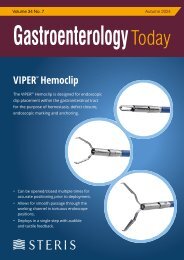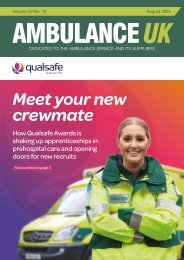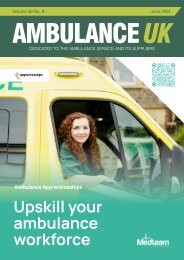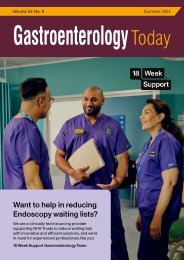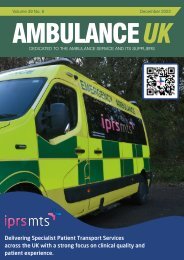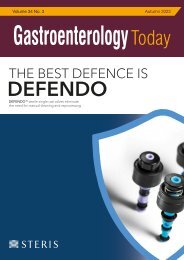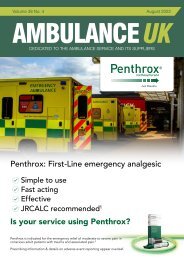Ambulance UK April 2021
Ambulance UK April 2021
Ambulance UK April 2021
Create successful ePaper yourself
Turn your PDF publications into a flip-book with our unique Google optimized e-Paper software.
NEWSLINE<br />
report following its review of<br />
DNACPR decisions during the<br />
COVID-19 pandemic. Over<br />
the last few months, the CQC<br />
has engaged with a range of<br />
stakeholders, including RC<strong>UK</strong>.<br />
They have spoken to people and<br />
their families affected by DNACPR<br />
decision-making during the<br />
pandemic, to a range of health<br />
and social care providers and<br />
professionals involved in their care<br />
and reviewed people’s records in<br />
seven CCG areas. This has led to<br />
them making recommendations<br />
around the following key areas:<br />
• information, training, and<br />
support<br />
• the need for a consistent,<br />
national approach to advanced<br />
care planning and DNACPR<br />
decisions<br />
• oversight and assurance<br />
at local and system level to<br />
ensure that people experience<br />
personalised, compassionate<br />
care in relation to DNACPR<br />
decisions<br />
The report cites ReSPECT as a<br />
good example of an advance care<br />
planning process that when done<br />
well, can support everyone to<br />
make decisions about their future<br />
care and treatment.<br />
SCAS<br />
Paramedics<br />
turn written-off<br />
ambulance into<br />
innovative training<br />
simulation pod<br />
Paramedics at South Central<br />
<strong>Ambulance</strong> Service (SCAS)<br />
have given life-saving treatment<br />
to an ambulance which was<br />
written off after a road traffic<br />
collision – by using it to create<br />
an innovative training pod.<br />
The SCAS education team in<br />
Newbury had the body of the<br />
vehicle repaired to repurpose it as<br />
a training simulator and provide<br />
the opportunity for students to<br />
learn in the real thing.<br />
It weighs 4.5 tonnes before the<br />
addition of kit and includes all the<br />
essentials – as well as a working<br />
tail lift and even a power line to<br />
flick on the blue lights and sirens<br />
to add to the experience.<br />
It is the latest addition to the<br />
family of simulators at the<br />
SCAS Education and Enhanced<br />
Simulation Centre, a facility that<br />
includes six purpose-built training<br />
and environment rooms that<br />
recreate patients’ journeys from<br />
“The ambulance converted was<br />
unfortunately involved in a serious<br />
road traffic collision and was not<br />
fit to return to the road, so not only<br />
have we avoided losing a vehicle<br />
from the fleet, we are now in the<br />
fortunate position of using this<br />
one to train a new generation of<br />
staff.”<br />
He added: “While there are many<br />
simulators around, many of these<br />
are purpose-built as opposed<br />
to developed from real vehicles<br />
and are therefore limited in their<br />
ability to provide a real-life training<br />
environment.<br />
“We believe this is the first pod<br />
of its kind having been salvaged<br />
from the scrapheap and able<br />
to provide the most realistic<br />
experience of any simulator – so<br />
we are extremely pleased with the<br />
outcome.<br />
“We’ve even had a label added<br />
to the side to say it is probably<br />
the best ambulance pod in the<br />
country - we think it is!”<br />
will be the first to use the new kit.<br />
Medics will be able to press a<br />
button to record if a patient or<br />
member of the public becomes<br />
threatening or aggressive. The<br />
footage can then be used in court<br />
to aid prosecutions.<br />
Paramedic Kristoffer Fairhurst,<br />
based in Burnley, will be amongst<br />
the first to use the cameras. He<br />
said: “Sadly it is all too common<br />
for frontline staff to be subject to<br />
violence by the very people we<br />
are trying to help. I have worked<br />
for the ambulance service for 13<br />
years and during that time I have<br />
been kicked, spat at, shouted at<br />
and even threatened with a knife.<br />
“This should not be happening and<br />
I am hoping that these cameras will<br />
give us an extra level of protection<br />
to deter incidents of abuse as well<br />
as assist with prosecutions and<br />
make staff feel safer.”<br />
In 2020, almost 400 incidents of<br />
physical assaults were reported<br />
against staff in the North West,<br />
a rise of 4% since 2018 despite<br />
lockdown measures in place.<br />
In addition, there were 1,061<br />
incidents of verbal abuse or<br />
threatening behaviour reported.<br />
Director of Operations Ged Blezard<br />
A report, also published today,<br />
by the charity Compassion in<br />
Dying, highlights the good and<br />
bad experiences of people<br />
from across the <strong>UK</strong> who have<br />
contacted them about DNACPR<br />
decisions made for them or their<br />
loved ones during the pandemic.<br />
While these significant reports<br />
highlight examples of poor<br />
practice in relation to DNACPR<br />
decision-making during the<br />
pandemic, they also recognise<br />
that not everyone wants<br />
cardiopulmonary resuscitation<br />
(CPR) to be attempted. For many<br />
people, DNACPR decisions offer<br />
reassurance that they will not be<br />
given an intervention that may be<br />
home, into to a mobile simulated<br />
ambulance and then at handover<br />
to a hospital’s emergency<br />
department resuscitation bay.<br />
“What we really love about the<br />
introduction of this simulation<br />
pod is that its authenticity will<br />
give students a much more<br />
enhanced and lifelike insight into<br />
the workings of the vehicle and<br />
its kit,” said Darren Best, Senior<br />
Education Manager at SCAS.<br />
NWAS<br />
<strong>Ambulance</strong> service<br />
to trial body worn<br />
cameras<br />
<strong>Ambulance</strong> crews in the North<br />
West are set to be equipped<br />
with body worn video cameras<br />
in a bid to reduce violence and<br />
aggression against frontline staff.<br />
As part of a national pilot, North<br />
West <strong>Ambulance</strong> Service (NWAS)<br />
will be rolling out the cameras<br />
from 31 March. It will start in areas<br />
that see the highest number of<br />
incidents of abuse against staff.<br />
Central Manchester, East<br />
said: “Our staff work day in, day<br />
out to protect and care for their<br />
patients, they do not deserve to be<br />
subject to abuse and assaults.<br />
“It’s a top priority for us to keep<br />
our staff safe and this is a huge<br />
step towards reducing violence<br />
and aggression against them. Not<br />
only will this aid in prosecutions of<br />
offenders but it is hoped to help<br />
de-escalate situations and avoid<br />
attacks from even taking place”<br />
NWAS has a dedicated violence<br />
and aggression group that has<br />
been set up to proactively target<br />
frequent offenders and work with<br />
the police and partner agencies<br />
to put sanctions in place where<br />
AMBULANCE <strong>UK</strong> - APRIL<br />
unwanted or unsuccessful.<br />
Lancashire and parts of Merseyside<br />
possible.<br />
Do you have anything you would like to add or include in Newsline? Please contact us and let us know.<br />
49



